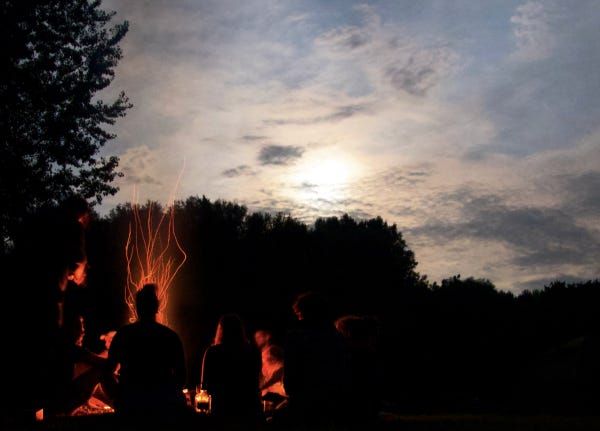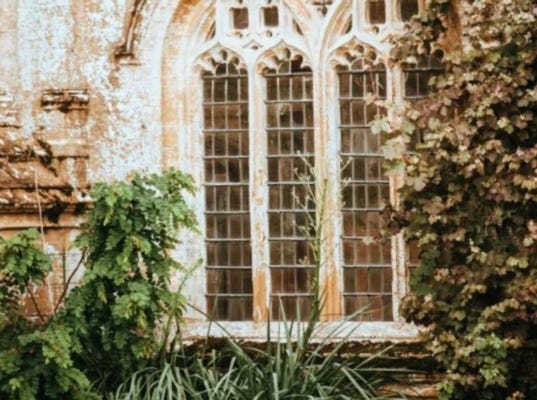Kathoc Bose 5: Discovery
Women never go alone to the Place of the Men, and yet, here she was. Waiting on the beach as the sun teetered on the horizon, Iz-lâ saw Kathoc Bose running down the tideline toward her.
Previous episodes • Part 1 • Part 2 • Part 3 • Part 4
Final episode • Part 6
Kathoc Bose 5: Discovery
Izlâ reached the sea in the early evening after an hour’s walk from the hill on which she lived. Women never go alone to the Place of the Men, and yet, here she was, standing on the beach just as the sun teetered on the horizon. She saw Kathoc Bose running up the tideline toward her. He took both her hands in his and looked up at her. Neither spoke for a moment.
“Iz-lâ? What are you doing here …”
“Kathoc Bose,” she whispered, “I want you.”
There was no place to take her. They made a fire and stayed on the beach all night, wrapped up in a blanket, wrapped up in each other. The pulse of the surf, in and out, rocked them to sleep, and in the morning, before anyone could see, she left the shelter of the grassy dune and was gone.
Kathoc Bose had been on the world of Veylas now for 162 days. Tonight, for the first time, he stood up to speak to all the men of the Gather as they sat around the fire. Determined to do it correctly, he spoke in their language, exactly as he’d practiced it.
“I want to thank you all for take me as your brother, for give me welcome here and for teach me so many things. I ask now ... permission … please … to make a house … my own house.” He struggled, but they understood him.
“You’re welcome to build your house, Kathoc. We’ll help you,” said Fahlo, speaking for all nine men. Every man lifted their hands into the air, palms up, a gesture of agreement.
“Thank you. I am humble for your generosity,” he said, slowly nodding to them, eyes closed, in the Velasím way. He knew his next request would unsettle them. “I want to make my house at the river-crossing on the hill.”
“The river crossing? Kathoc? You want to live alone … and away from us?” The men rumbled to each other, trying to make sense of this odd idea.
“Yes, Fahlo. Hear me. We’re similar, the men of my world and the men of Veylas, but not all of your ways are my ways. I am good here! I want to live and work with you every day, as I have for many moon-cycles, but I want to stay at night in my own house on the hill. It’s only a short walking.” More mumbled comments circulated among the men.
“I understand it’s the way of the Velasím to have many different women, and I respect your way. But I want to be only with Iz-lâ. I hope she’ll choose only me. I’ll never ask her to be my wife, or to abandon the Place of the Women — I know she would not choose that. But, if I build my house half-near to her, maybe she’ll choose to come to me more, that is all. I am a stranger, yes, but I see no harm in it.”
“But, Kathoc, you know it is not correct to take ...”
“Yes, Brahn, yes, I know, but I think for me it is a good plan.”
A long discussion erupted of which Kathoc understood little, but there was contention — of that he was certain, and he was sorry for it.
“We’re divided in our thinking, Kathoc Bose,” said Fahlo. “We’ll talk more of this tomorrow after we have time to consider. We’ll have an answer for you then.”
“I’m sorry to make a problem,” he said, sitting back down. Kathoc regretted the dissension among the men. It was the first conflict he had ever seen in the circle and it grieved him to be the cause of it.
Ultimately, the men could not come to an agreement about Kathoc’s deviance, but, as he was a stranger among them, they would allow him to build his house away from the others. If any problem arose, they would then reconsider. It was the best he could hope for.
Kathoc began gathering stones from the river’s edge for a few hours at the end of each day. He laid the foundation and built the hearth of his small house, setting it into the hill just above the river. Brahn, who was younger and had fewer misgivings about Kathoc’s choice, came to help him. Later three more men came. Though they often didn’t understand his ideas, they liked Kathoc Bose for all his oddness. They were his friends.
Facing the challenge of lifting the stones from the river side, Kathoc had devised a system of pulleys and ropes attached to three trees. Three swinging baskets carried the river rock up the incline with only a pull of the rope.
The men studied his simple, but powerful machine. He taught them the mechanical principles of block and tackle, and with so many hands, the building was completed in days. It was only one small room, truly not much more than a bedroom, with a window, a door, and a roof of slate.
Notes from the log of Kathoc Bose
Day 130. “I am slowly remembering more of my life before. Each day brings back a memory or a hint of a memory. I remember being watched. I remember chaos. I remember fires and violence in the streets, and mass death. The details are lost to me, still, but I have visions of machines — machines taking control of communications, taking control of law enforcement. I remember choosing to live off-world, risking travel with others within our solar system to a newly discovered inhabitable moon. But, how did I get lost? Where are the others who went with me. Did they not survive? I have no answers to these questions. Yet, in whatever way I arrived here, I am glad for this place.”
Day 132. “My house, such as it is, is nearly complete. I chose to build it near the path to the Place of the Women, which is more than three miles away. It’s half way up the path. Some of the men don’t approve of my plan. It isn’t normal, they say. Several are of the opinion that my desire for monogamy will surely cause unrest among both the women and the men. Though some have been helpful in the construction of my house, I know they, too, are at a loss as to why I would attach myself to only one woman. It’s all up to Iz-lâ, now. She’ll be influenced by the other women, I’m sure, but I hope she’ll choose to come to me in the evenings— if not as my wife, then as whatever she’s able to be.”
Day 134. This is the week that we go to the Place of the Women for three days. I can’t predict what awaits me there.
Day 135. “My house is now finished. Today the men generously gave me a bed, a table and a chair as gifts.
They were resting side by side on a shady bench in the women’s garden. They’d been picking fovah pods all morning, pods that looked like beans, yet they were not beans. He bit into one and spit it out. The taste was sharply bitter. Iz-lâ laughed, saying, “You cannot eat fovah, Kathoc. They’re used only as medicine, women’s medicine.”
They sat silently for a while listening to the mocca birds. “Iz-lâ, you haven’t said— what do you think of my plan for us?”
“I think it’s difficult, Kathoc. The women will not approve. I’ll talk to them, explain to them, but they believe that to choose only one partner is selfish and it will cause division.”
“But what do you think? Would you come down the hill to me sometimes? Iz-lâ?”
“I’ll come, yes! I want to come. But I’ll still live here with the women as always.
“They’ll all talk about us at the council fire tonight. Will we go to listen?”
“No, we can only wait,” she said, laying her head on his shoulder, kissing his sun-warmed neck.
The clear morning light fell on his peaceful face as he lay sleeping next to Iz-lâ. She roused him with a whisper. “Wake up, Kathoc Bose. It is day.” Kathoc reached out and pulled her to him. They didn’t rise until hunger demanded it.
Hearing no word from the council, Iz-lâ and Kathoc put on their sandals and walked up the long hill to the edge of the forest. She had promised to take him to the Place of Books, a depository, he’d supposed, of Velasím stories and history. He was curious. She led him toward a dense stand of yellow deciduous trees, where he saw a partially hidden, large building of stone. It could scarcely be seen through the ivy and dense rodenron shrubs.
The corroded hinges of the door scraped and groaned as Iz-lâ pulled it open. Walking in, Kathoc saw it was one large, high-ceilinged room. Light poured in through two wide windows to reveal old plaster, loose and falling away from the underlying stonework. Every wall was lined with shelves, floor to ceiling, each shelf filled with what looked like narrow metal canisters. They were covered with dust and the trails of stongh bugs. Kathoc picked up one of the silvery cylinders. It was feather-light and had the worn letters, “A…CH…TEC…RE” on the exterior. “What are these, Iz-lâ?”
“They are our books. We have hundreds of them here.”
“Do you read them?”
“I can’t read them. No one is left who can read them, but we study the khroma — the light pictures.”
“Light pictures. Can you show me one?”
Iz-lâ took the cylinder from his hand, set it on a table and twisted the top. There was a smooth click, and instantly, a diffused light emanated from the top. A three-dimensional figure formed and hovered in the air above the cylinder.
“See! It is like magic,” said Iz-lâ.
Kathoc was astonished. Unable to speak, his mind racing, he read the caption, “New York City 1930”. It was a holographic image of the Chrysler building.
Links to previous episodes and the final part are at the top of this page.
Photo of Iz-lâ is by Jeremy Bishop. Photo of Fahlo is by Joao Vitor Duarte. Both on Unsplash.com. Both photos are edited.












There's definitely another bit to this story. It looks like the library at Alexandria... I hope they've found the key before it all crumbles. They've made it fireproof, so there's hope.
Really well done, Sharron! I like how you’ve unraveled bits and pieces of Kathoc’s past through the story. I’m intrigued to see how it all ends! Can’t wait to see what happens in the final installment.